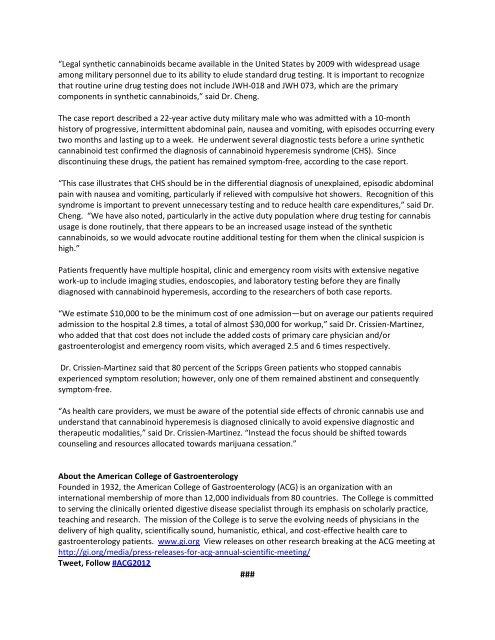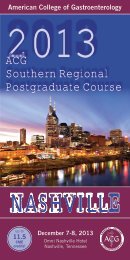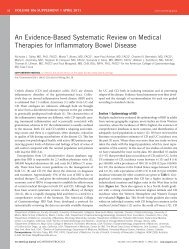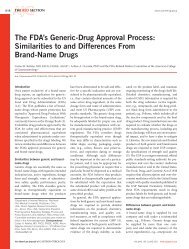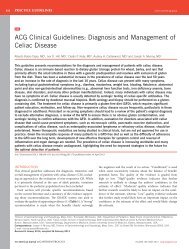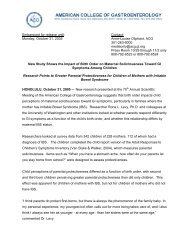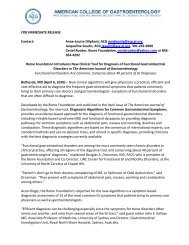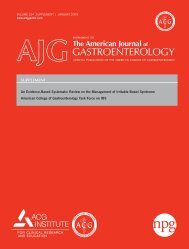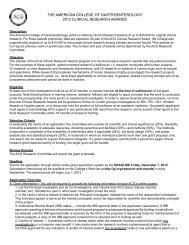Marijuana Use May Cause Severe Cyclic Nausea, Vomiting, A Little ...
Marijuana Use May Cause Severe Cyclic Nausea, Vomiting, A Little ...
Marijuana Use May Cause Severe Cyclic Nausea, Vomiting, A Little ...
Create successful ePaper yourself
Turn your PDF publications into a flip-book with our unique Google optimized e-Paper software.
“Legal synthetic cannabinoids became available in the United States by 2009 with widespread usage<br />
among military personnel due to its ability to elude standard drug testing. It is important to recognize<br />
that routine urine drug testing does not include JWH-018 and JWH 073, which are the primary<br />
components in synthetic cannabinoids,” said Dr. Cheng.<br />
The case report described a 22-year active duty military male who was admitted with a 10-month<br />
history of progressive, intermittent abdominal pain, nausea and vomiting, with episodes occurring every<br />
two months and lasting up to a week. He underwent several diagnostic tests before a urine synthetic<br />
cannabinoid test confirmed the diagnosis of cannabinoid hyperemesis syndrome (CHS). Since<br />
discontinuing these drugs, the patient has remained symptom-free, according to the case report.<br />
“This case illustrates that CHS should be in the differential diagnosis of unexplained, episodic abdominal<br />
pain with nausea and vomiting, particularly if relieved with compulsive hot showers. Recognition of this<br />
syndrome is important to prevent unnecessary testing and to reduce health care expenditures,” said Dr.<br />
Cheng. “We have also noted, particularly in the active duty population where drug testing for cannabis<br />
usage is done routinely, that there appears to be an increased usage instead of the synthetic<br />
cannabinoids, so we would advocate routine additional testing for them when the clinical suspicion is<br />
high.”<br />
Patients frequently have multiple hospital, clinic and emergency room visits with extensive negative<br />
work-up to include imaging studies, endoscopies, and laboratory testing before they are finally<br />
diagnosed with cannabinoid hyperemesis, according to the researchers of both case reports.<br />
“We estimate $10,000 to be the minimum cost of one admission—but on average our patients required<br />
admission to the hospital 2.8 times, a total of almost $30,000 for workup,” said Dr. Crissien-Martinez,<br />
who added that that cost does not include the added costs of primary care physician and/or<br />
gastroenterologist and emergency room visits, which averaged 2.5 and 6 times respectively.<br />
Dr. Crissien-Martinez said that 80 percent of the Scripps Green patients who stopped cannabis<br />
experienced symptom resolution; however, only one of them remained abstinent and consequently<br />
symptom-free.<br />
“As health care providers, we must be aware of the potential side effects of chronic cannabis use and<br />
understand that cannabinoid hyperemesis is diagnosed clinically to avoid expensive diagnostic and<br />
therapeutic modalities,” said Dr. Crissien-Martinez. “Instead the focus should be shifted towards<br />
counseling and resources allocated towards marijuana cessation.”<br />
About the American College of Gastroenterology<br />
Founded in 1932, the American College of Gastroenterology (ACG) is an organization with an<br />
international membership of more than 12,000 individuals from 80 countries. The College is committed<br />
to serving the clinically oriented digestive disease specialist through its emphasis on scholarly practice,<br />
teaching and research. The mission of the College is to serve the evolving needs of physicians in the<br />
delivery of high quality, scientifically sound, humanistic, ethical, and cost-effective health care to<br />
gastroenterology patients. www.gi.org View releases on other research breaking at the ACG meeting at<br />
http://gi.org/media/press-releases-for-acg-annual-scientific-meeting/<br />
Tweet, Follow #ACG2012<br />
###


